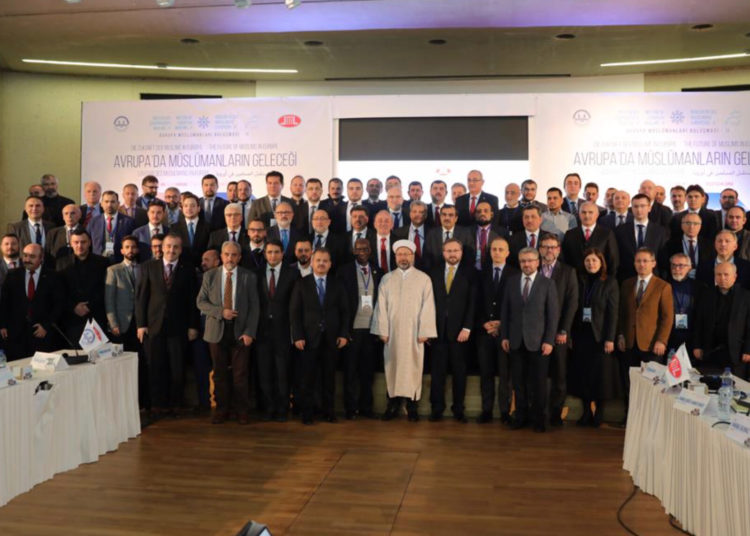The Turkish government’s Religious Affairs Directorate (Diyanet), in cooperation with the Muslim Brotherhood network in Europe, is set to woo European Muslims with a new secretariat to be set up in the Turkish capital of Ankara.
The Diyanet and its German affiliate, the Turkish-Islamic Union for Religious Affairs (DİTİB), held a conference in the German city of Cologne Jan. 2-4, 2019 to address issues facing European Muslims. Some 100 representatives reportedly attended the three-day event, which concluded with 18-point final declaration.
A decision was taken to set up a secretariat under the Diyanet in Ankara that will oversee the meetings of European Muslims. The secretariat will also organize a major gathering of European Muslims every two years.
The event, the Second Meeting of European Muslims, was attended by Ali Erbaş, the head of Turkey’s Religious Affairs Directorate, and Hussein Mohammed Halawa, general secretary of the European Council for Fatwa and Research (ECFR), a Dublin-based Muslim Brotherhood organization that serves as a channel for controversial cleric Yusuf al-Qaradawi.

Speaking at the event, Erbaş rejected such terms as moderate Islam, European Islam or French Islam and said all efforts to coin such terms would be in vain. He described the hostility against Islam as a crime against humanity and accused print, broadcast and social media of hiding behind criticism to cover up the hostility against Islam.
Turkey’s top government imam also criticized Germany and other European countries, although not by name, and said host countries’ expectation that immigrant Muslim communities would sever ties with their countries of origin was inhuman and against nature. He underlined that policies developed by host countries without the involvement of volunteer Muslim groups in Europe were doomed to fail.
“Because marginalizing civil society organizations or trying to reshape them not only amounts to an interference in religious, legal and individual freedoms but also means people will be left vulnerable and defenseless to assimilation,” he added.

Erbaş noted that it was important to monitor developments with regards to Muslims in Germany and Europe and asked for solutions to cope with the narrative and activities to smear Muslims.
The Cologne-based DİTİB is the largest Islamic umbrella group in Germany as well as in Lower Saxony and Bremen. It runs more than 900 mosques tied to the Turkish government’s Directorate of Religious Affairs, which provides imams to DİTİB mosques.
In recent years, DİTİB has been accused of acting as the long arm of the Turkish government. Some imams are alleged to have acted on the orders of Turkish diplomatic posts to spy on followers of the Gülen movement, a civic group that is critical of the Recep Tayyip Erdoğan government. The movement is led by US-based Turkish Muslim scholar Fethullah Gülen.
In February 2017 German police teams raided the apartments of four DİTİB imams in North Rhine-Westphalia and Rhineland-Palatinate who were suspected of acting as informants on sympathizers of the Gülen movement. The Federal Public Prosecutor’s Office (GBA) said the imams had acted on an order issued on Sept. 20, 2016 by the Religious Affairs Directorate to spy on Gülen movement sympathizers.
German Justice Minister Heiko Maas said the four imams were members of DİTİB. “It is very clear that the influence of the Turkish state on DİTİB is big. The association must plausibly disengage itself from Ankara,” Maas said in a statement.
The final communiqué issued at the end of the event in Cologne described the Gülen movement as a “terrorist organization,” reflecting the Turkish government’s official line. This stands in sharp contrast to the public record that shows the movement has not been involved in any violence. In fact, the track record of the movement’s leader, Gulen, shows the cleric has been opposed for decades to any violence or manipulation of religion for political goals.
Erdoğan accused Gülen of staging corruption probes in 2013 and a failed coup in 2016. Gülen has repeatedly and strongly denied these allegations, and the Turkish government has so far failed to present any evidence to back up its claims.












